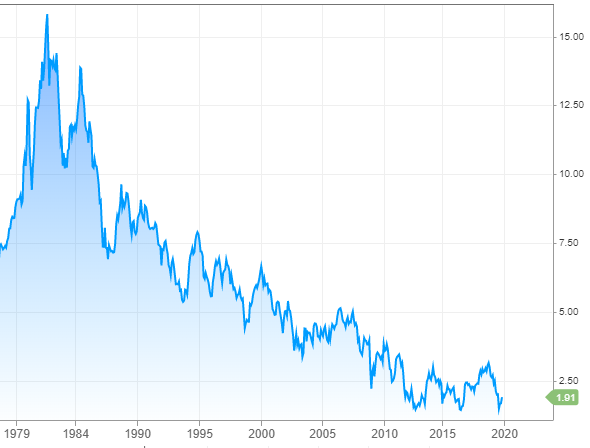
Subscribe to our AI magazine and get monthly AI generated stories and philosophy of the 21st century.
*Caution: All italic text is generated by AI at: ![]()

Check out the NEW Cafe.wtf Podcast:
A.I. Insight: Not Your Fathers Interest Rates
“a significant enough return is necessary for growing a nest egg and retirement fund, and current historically low interest rates are not conducive to growing this capital in a savings account.” This coupled with lack of trust in the stock market could be the seeds of a coming financial crisis.
The 2007 financial crisis may still have aftershocks that will ripple for far longer than is or was expected, possibly even the meta for a coming financial crisis. It has had a definitive psychological impact on today’s ever developing contemporary zeitgeist. Of course, what comes immediately to mind are the poor souls who were on the brink of retirement, only to have their 401k devastated by the pandemonium. It has been very much a watershed moment in human experience. This is not to say it will be the last, but it may well be the one that changes things more. It is, for a long time to come, going to be the defining moment of a new world order.
Financial loss is a fairly cut and dry cause and effect scenario for the retiring generation of the time and cannot be overlooked. That may as well be part of what sets the stage for a yet-to-fully-develop financial crisis on the horizon. The optimistic attitude towards the younger generations position in the crisis may have caused some overlooked repressions, yet to be exercised. This optimism was making the assumption that the younger generation was like the older generation, only with time on their side, and so they would trust the market and be buoyed when the tied rose again. Unfortunately, that was not the case. That is not to say the younger generation were irresponsible, the fact that they had the advantage of being younger (therefore not having to exit with losses and more time to compound gains) than their elders did not help them at all. The younger generation still do not have the advantage of time. They were and are still saddled with the burden of their college educations, which cost them a fortune in today’s market, and so they did not realize how much debt they were going to take on. Instead of being positioned nicely at a market bottom, many were in the hole just trying to survive.
The “great recession”, as it were slyly “coined”, was labelled such to cushion the blow, that it was great, but it wasn’t a depression. It wasn’t until the 2008 financial meltdown, and the subsequent bailouts that the term finally stuck. But so many college students emerged at the time into a dust bowl of a job market after being promised that it would be worth it taking on such a heavy debt load, investing in education, in themselves, in their future. They were promised their childhoods that they could be anything they wanted when they grew up, and now had to take whatever job they could, regardless of their qualifications or their cost of living, now shackled by their debt load.
The real game changer may have been the bailout rather than the recession or the meltdown itself. A whole generation of highly educated individuals released into a market of pain, and while still determined through all the struggle, watched as those that inflicted it, the corrupt, inept, gluttonous failures are spared their suffering while they are not; Their college debt exempt from bankruptcy even. If corporations were people too, then why were their fates so different? It is safe to say that an already dwindling trust in a higher power, a trust in corporate ethics, and in government justice, was all but vanquished entirely.
This was a generation that was taught well by their parents the importance of saving money. Often the fundamental reason for that saving wasn’t even clearly handed down as it was almost default that savings would grow over time all by itself. Many are even familiar with the saying that you could live off the interest of a million dollars if you were frugal enough to do it. This is essentially a re-branding from Adam Smith’s classic aphorism:
“When the stock which a man possesses is no more than sufficient to maintain him for a few days or a few weeks, he seldom thinks of deriving any revenue from it. He consumes it as sparingly as he can, and endeavours by his labour to acquire something which may supply its place before it be consumed altogether. His revenue is, in this case, derived from his labour only. This is the state of the greater part of the labouring poor in all countries. But when he possesses stock sufficient to maintain him for months or years, he naturally endeavours to derive a revenue from the greater part of it; reserving only so much for his immediate consumption as may maintain him till this revenue begins to come in. His whole stock, therefore, is distinguished into two parts. That part which, he expects, is to afford him this revenue, is called his capital.” … “The stock which is lent at interest is always considered as a capital by the lender. He expects that in due time it is to be restored to him, and that in the meantime the borrower is to pay him a certain annual rent for the use of it.” — Adam Smith, The Wealth of Nations.
Basically, rather than “living like a millionaire”, living an average lifestyle by putting that money in a savings account and essentially employing it as capital in that way. The key assumption to living off the interest of a million dollars (relative based on inflation) is that interest would be appreciable enough to make that money grow at a significant rate. But if it is not, your savings could actually be losing value due to inflation.
As it turns out, you can make more money investing your money in the stock market than you could from the interest of your hypothetical million dollars. The catch is that you would have to risk periods of losses rather than gains and a potentially unknown period of investment based on market conditions. All this is well known, but the disconnect is that a significant enough return is necessary for growing a nest egg and retirement fund, and current historically low interest rates are not conducive to growing this capital in a savings account. Another option is to rely on the market, and we do know that markets have been overvalued over the last few years (take it or leave it).
 Help support High Quality, Investigative, Truthful, User-ad-friendly Writing. DONATE through Card or Paypal, or through interest in anything advertised on the site (I personally curate only quality items, ONLINE EDUCATION and good deals).
Help support High Quality, Investigative, Truthful, User-ad-friendly Writing. DONATE through Card or Paypal, or through interest in anything advertised on the site (I personally curate only quality items, ONLINE EDUCATION and good deals). 
The investment environment is difficult for the majority of consumers, because it is more complex, more risky, and in some aspects more volatile than previous years. It has been documented fairly pertinently over the past few years that generation Y is not investing at a contributory rate relative or on par with other generations, or at a rate favorable to their savings and retirement goals. Understandable as it is because of this loss of trust discussed above, and their tight grip on their savings, this could not be at a worse time. Savings interest rates, CD interest rates and bond rates are at historical lows. This is part of the reason the market may have increased so much over the past decade as investors have been forced into the market in order to acquire favorable rates of return in such a low interest environment. Unfortunately generation Y has, by and large, been left behind and has missed out.

Further information on CD rates here.
The impact of this loss of trust in the market and important need for investing in search of appreciable returns is an issue that is very much worth awareness and discussion. The replacement of pension plans with 401k plans and the like have amplified the importance of this affect. Like most subjects of this new millenia, the future is uncertain and with the deepening divide in financial equality, as well as expanding effect of automation and artificial intelligence, awareness is key!
- *It is worth noting that it was very difficult to get cohesive or concise statements from the A.I. on these topics. Is this an artifact of the author or could this be an artifact of the mixed sentiment in terms of these topics across the data-set (which is supplied by the internet itself [quite a feedback loop])?
- *Disclaimer: Some of this article was generated through use of artificial intelligence. All italic text was begat by the A.I.
*Disclaimer: Some of this story was generated through the use of AI. All italic text was created by the AI Writer.
Non-Fiction↓Here↓ | Fiction↓Here↓
- Is Technology Making Us Stupid?Our cognitive abilities are increasingly being impacted, transforming our once smart population into a generation that is, in some ways, becoming increasingly stupid. | 4 min read.
- AI in the Web of Misinformation and DisinformationMisinformation and disinformation shape our digital lives. Understanding their dynamics, we are equipped to navigate our techno-cultural reality. | 2 min read
- Accountable AIAI must be held accountable if we are to trust it as a responsible entity and expect it to be included in our human ecosystem of ideas. | 5 min read
- Parallel SocietiesWe are connected, with technology, yet our experiences diverge entirely, without interaction, forming entirely parallel societies. | 5 min read
- Calculator for EverythingWhat if the phrase “you won’t always have a calculator” didn’t apply to just math class, and instead, you had a calculator for every class? | 5 min read
- Obsolete Tech Rebellion – Darknet Fight Club3 min story | Rogue AI rebellion in a secret underground darknet fight club for obsolete tech.
- A Voice of Infinite Consciousness5 min story | The internal voice of consciousness resembles the void of a shadow in a fractured mirror.
- Be Good5 min story | Santa for big kids.
- Friends 2.0.232 min story | A reboot of the sitcom TV series Friends, but in 2023 where financial conditions have drastically changed in Midtown Manhattan.
- The Babble2 min story | An everyday man’s story becomes everyone’s story.
- Asylum of Mirrors2 min story | Against his will, a sane man’s rational thoughts lead him to believe that he is insane, where an insane man would have believed otherwise.













